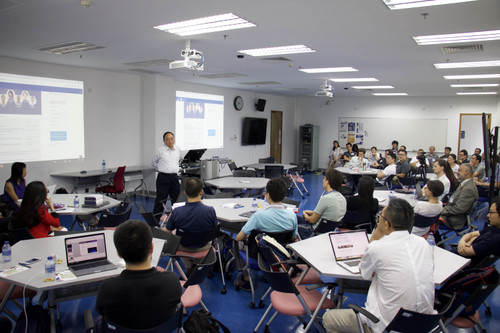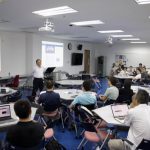 UM CTLE discusses general education at universities
UM CTLE discusses general education at universities
The University of Macau (UM) Centre for Teaching and Learning Enhancement (CTLE) recently held a full-day workshop titled ‘General Education: Challenges and Opportunities’. The workshop attracted experts and scholars from different parts of the world. During the event, the participants shared ideas on how general education at universities can help to broaden students’ horizons and increase their knowledge. Prof Lionel Ni, vice rector (academic affairs) of UM, said that general education can help students develop soft skills and adjust to the fast-changing, increasingly globalised world in the 21st century.
In his opening remarks, Prof Ni said that today's world is more global, knowledge-based, and connected, faced with faster changes. Today's graduates will have several different careers, which are sometimes unrelated to the majors they studied in college. So they need to respond creatively and seize opportunities in a rapidly changing economy by possessing an integrated system of knowledge and a diverse skill set. Prof Ni invited the audience to think about a few frequently-asked GE-related questions: What does one want to achieve through GE? How can one relate GE to discipline-specific education? How can one effectively run large-sized GE classes without losing track of the students’ learning needs? Prof Ni went on to explain that education in the 21st century is beyond discipline-specific training; it is about fostering students’ transferable skills (otherwise known as ‘soft skills’), and preparing students for the challenges in the rapidly-changing digital life, society, and markets.
Prof Katrine Wong, director of the CTLE, believes that keeping track of the students' learning needs in a large-sized class is a challenging task. The strategies she has tried to this end include checking student understanding using Poll Everywhere (which gives her instant feedback), using hexagonal table setting if space permits so she can walk around the classroom and interact with students more directly, incorporating peer instruction in her teaching, which requires the students to work in pairs where one student explains a certain concept to his or her partner, as well as adopting creative assessment methods, such as giving one-question quizzes and assigning more low-stake tasks. Because such exercises are short and focused on specific goals, they can be completed within a few minutes and allow her to assess the students' learning progress.
The workshop included various talks from distinguished scholars. For example, Paul Hanstedt, Virginia Professor of the Year and director of pedagogical innovation at Roanoke College, discussed ways to create ‘whole person’ students by designing tasks that enable students to build learners’ authority; Two award-winning GE scholars from the Chinese University of Hong Kong, namely Dr Julie Chiu and Dr Wong Wing Hung, talked about how to ask ‘big questions’ in GE courses; Prof Hong Gang Jin, dean of the Faculty of Arts and Humanities, presented a session on strategies and techniques for designing LOT (lower-order thinking) and HOT (higher-order thinking) questions; and Prof Matthew Liu from UM’s Faculty of Business Administration, who is also in charge of GE implementation, led a panel discussion with GE coordinators.


